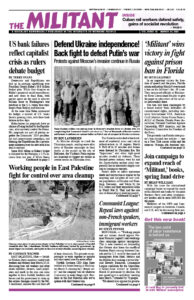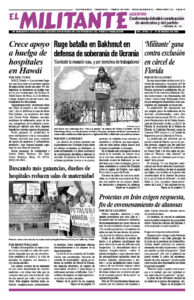In an important victory for freedom of speech and the press, Florida prison authorities March 9 overturned a ban on the Militant’s Jan. 30 issue. They instructed officials at Blackwater River Correctional Facility to give the paper to subscribers of the socialist newsweekly there.
The ban had been challenged by a broad outcry from defenders of constitutional rights, including Amnesty International USA, American Civil Liberties Union Prison Project, ACLU of Florida, Florida Press Association, National Coalition Against Censorship, PEN America, and the Reporters Committee for Freedom of the Press.
The privately run Florida state prison’s ban claimed two articles — one on a New York nurses strike and the other on “Women, life, freedom” protests in Iran — were a “threat to the security, order, or rehabilitative objectives” of the prison.
The impoundment at Blackwater River “is a blatant violation not only of the Constitutional rights of the inmates to read what material they choose but also for the Constitutional protection of freedom of the press which the Militant enjoys,” Mark A. Lee, financial secretary/treasurer of Local 57 of the Bakery, Confectionery, Tobacco Workers and Grain Millers International Union in Mt. Gilead, Ohio, wrote to the Florida Department of Corrections Literature Review Committee.
Along with the ban at Blackwater River, the wardens at two other Florida state prisons — Charlotte and Wakulla Correctional Institutions — have been withholding the paper from at least some inmates without any written notice of impoundment, a violation of the Florida prison system’s own regulations.
Carl Roche, a railroad engineer in Miami, wrote, “The right to read is on the same level as the right to have a union and safe movement of trains.” He was one of a number of individuals in Florida and from around the country who wrote the committee protesting the ban, including a farmer in Plant City, Florida; a family doctor in Miami; and a Miami artist.
This was the first time in two years that Florida prison officials had impounded an issue of the Militant. But starting in 2013 Florida prison officials have tried to suppress the paper nearly 50 times. The Militant challenges every attempt to ban the paper and has won the vast majority.
“This time the outlandish ‘reason’ given for banning the paper helped make it clear that this had nothing to do with ‘security’ and everything to do with suppressing the Militant because of our working-class politics,” said Militant editor John Studer. “In fact, that has always been the case when prison officials try to block the paper.
“Our fight is not just for the Militant,” he added. “Every time we fight these bans, we are helping defend the right to free speech and freedom of the press for everyone. Prison officials in Florida and elsewhere ban thousands of papers, magazines and books. They assume no one will notice or complain. We are setting an example others can use.
“That’s part of the reason we get the broad support we receive. We have become known as determined and effective fighters for crucial political rights.
“We are convinced that workers behind bars have the right to read material of their choosing, to think for themselves, to form their own opinions,” Studer said, “to follow the class struggle battles unfolding today.”
Melvin Herring, assistant chief of education for the Florida Department of Corrections, wrote to organizations and individuals that had protested the ban, saying, “The publication is being processed for release to the inmate.”
But he made no mention of the blocking of the paper from subscribers at Charlotte and Wakulla. The Militant’s attorney, David Goldstein, of the prominent civil liberties law firm Rabinowitz, Boudin, Standard, Krinsky and Lieberman, plans to follow up with officials on these issues.
The Militant currently has 193 subscribers in federal and state prisons in 26 states. “Every time we win against those who try to ban the Militant, we gain more respect and more subscribers,” Studer said.

